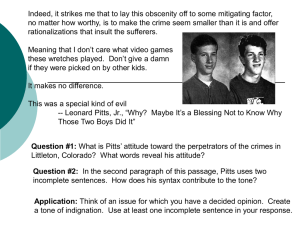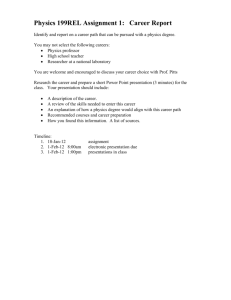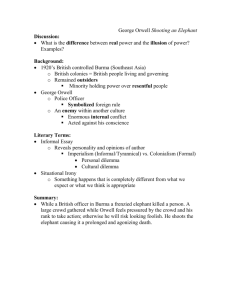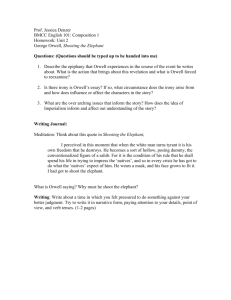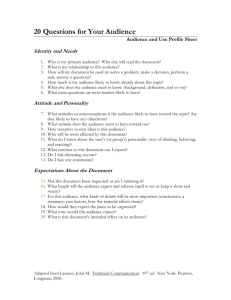AP Warm-ups Set 5
advertisement
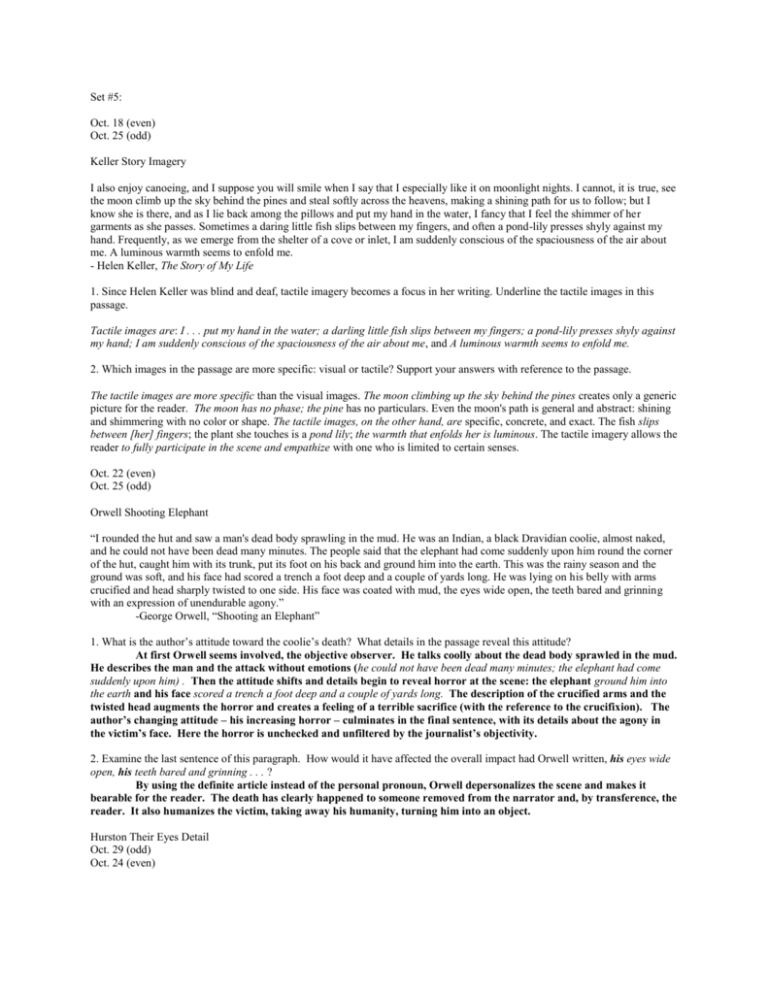
Set #5: Oct. 18 (even) Oct. 25 (odd) Keller Story Imagery I also enjoy canoeing, and I suppose you will smile when I say that I especially like it on moonlight nights. I cannot, it is true, see the moon climb up the sky behind the pines and steal softly across the heavens, making a shining path for us to follow; but I know she is there, and as I lie back among the pillows and put my hand in the water, I fancy that I feel the shimmer of her garments as she passes. Sometimes a daring little fish slips between my fingers, and often a pond-lily presses shyly against my hand. Frequently, as we emerge from the shelter of a cove or inlet, I am suddenly conscious of the spaciousness of the air about me. A luminous warmth seems to enfold me. - Helen Keller, The Story of My Life 1. Since Helen Keller was blind and deaf, tactile imagery becomes a focus in her writing. Underline the tactile images in this passage. Tactile images are: I . . . put my hand in the water; a darling little fish slips between my fingers; a pond-lily presses shyly against my hand; I am suddenly conscious of the spaciousness of the air about me, and A luminous warmth seems to enfold me. 2. Which images in the passage are more specific: visual or tactile? Support your answers with reference to the passage. The tactile images are more specific than the visual images. The moon climbing up the sky behind the pines creates only a generic picture for the reader. The moon has no phase; the pine has no particulars. Even the moon's path is general and abstract: shining and shimmering with no color or shape. The tactile images, on the other hand, are specific, concrete, and exact. The fish slips between [her] fingers; the plant she touches is a pond lily; the warmth that enfolds her is luminous. The tactile imagery allows the reader to fully participate in the scene and empathize with one who is limited to certain senses. Oct. 22 (even) Oct. 25 (odd) Orwell Shooting Elephant “I rounded the hut and saw a man's dead body sprawling in the mud. He was an Indian, a black Dravidian coolie, almost naked, and he could not have been dead many minutes. The people said that the elephant had come suddenly upon him round the corner of the hut, caught him with its trunk, put its foot on his back and ground him into the earth. This was the rainy season and the ground was soft, and his face had scored a trench a foot deep and a couple of yards long. He was lying on his belly with arms crucified and head sharply twisted to one side. His face was coated with mud, the eyes wide open, the teeth bared and grinning with an expression of unendurable agony.” -George Orwell, “Shooting an Elephant” 1. What is the author’s attitude toward the coolie’s death? What details in the passage reveal this attitude? At first Orwell seems involved, the objective observer. He talks coolly about the dead body sprawled in the mud. He describes the man and the attack without emotions (he could not have been dead many minutes; the elephant had come suddenly upon him) . Then the attitude shifts and details begin to reveal horror at the scene: the elephant ground him into the earth and his face scored a trench a foot deep and a couple of yards long. The description of the crucified arms and the twisted head augments the horror and creates a feeling of a terrible sacrifice (with the reference to the crucifixion). The author’s changing attitude – his increasing horror – culminates in the final sentence, with its details about the agony in the victim’s face. Here the horror is unchecked and unfiltered by the journalist’s objectivity. 2. Examine the last sentence of this paragraph. How would it have affected the overall impact had Orwell written, his eyes wide open, his teeth bared and grinning . . . ? By using the definite article instead of the personal pronoun, Orwell depersonalizes the scene and makes it bearable for the reader. The death has clearly happened to someone removed from the narrator and, by transference, the reader. It also humanizes the victim, taking away his humanity, turning him into an object. Hurston Their Eyes Detail Oct. 29 (odd) Oct. 24 (even) “The dog stood up and growled like a lion, stiff-standing hackles, teeth uncovered as he lashed up his fury for the charge. Tea Cake split the water like an otter, opening his knife as he dived. The dog raced down the back-bone of the cow to the attack and Janie screamed and slipped far back on the tail of the cow, just out of reach of the dog's angry jaws.” - Zora Neale Hurston, Their Eyes Were Watching God 1. Which details reveal that the dog has rabies? What effect do these details have on the reader? The details that reveal the dog has rabies are the dog’s growl[ing] like a lion, the stiff-standing hackles, the uncovered teeth, and the angry jaws. These details re-create the terror of the scene and make the reader a full participant in the action. 2. Contrast the details used to describe Tea Cake (the male protagonist) and Janie (the female protagonist). What do these details reveal about the author's attitude toward these two characters? The details used to describe Tea Cake show him to be active and in control: He splits the water, opens his knife, and dives. Janie, on the other hand, is described with details that are passive and helpless: She screams and slips out of reach. These details reveal a traditional attitude toward men, women, and these two characters: men (specifically, Tea Cake) are proactive, purposeful, and protective; women (specifically, Janie) are reactive, passive, and protected. Pitts Blessing Tone Oct. 28 (even) Oct. 31 (odd) Indeed, it strikes me that to lay this obscenity off to some mitigating factor, no matter how worthy, is to make the crime smaller that it is and offer rationalization that insult the sufferers. Meaning that I don’t care what video games these wretches played. Don’t give a damn if they were picked on by other kids. It makes no difference. This was a special category of evil. - Leonard Pitts Jr., “Why? Maybe It’s a Blessing Not to Know Why Those Two Boys Did It” 1. What is Pitts’s attitude toward the perpetrators of the crimes in Littleton, Colorado? What words reveal his attitude? Pitts’s attitude toward the perpetrators of the crime in Littleton, Colorado, is one of complete disgust. His tone is contemptuous and angry. Words that reveal his attitude include calling the crime an obscenity, discounting mitigating factors as an insult to the sufferers, calling the perpetrators wretches, and calling the crime a special category of evil. 2. In the second paragraph of this passage, Pitts uses two incomplete sentences. How does his syntax contribute to the tone? The incomplete sentence in paragraph two contributes to the tone by adding a shock value and emphasis to Pitts’s anger and disgust. It is as if Pitts is so outraged that he cannot even bother to complete the sentences. The fragments give the passage a fast pace, reinforcing surety of judgment, and lending a passionate intensity to Pitts’s anger. Ondaatje Syntax Nov. 4: odd Oct. 30: even “She is a woman who misses moisture, who has always loved low green hedges and ferns.” -Michael Ondaatje, The English Patient 1. Both of the subordinate clauses in this sentence modify woman. What effect does this parallel structure have on the sentence? The use of two subordinate clauses to modify woman emphasizes the qualities the narrator has isolated: the love of moisture and plants. The sentence gives equal weight to her missing moisture and loving green hedges and ferns. However, both of these attributes are secondary to her being a woman, the focus of the sentence. The layering of the subordinate clause also gives gave to the sentence, reinforcing the image of a woman of considerable sensitivity and charm. 2. How would it change the feeling evoked by the sentence if it read: She misses moisture and has always loved green hedges and ferns. Main clause positions indicate main ideas. The new sentence transforms the subordinate clauses into parts of the main clause, thereby transforming the meaning of the sentence. The key idea in the new sentence is that the character misses moisture and loves green plants. In the original sentence, the main clause states that she is a woman. The focus of Ondaatje’s sentence is her womanness; the love of moisture and green plants is secondary. The feeling of the original is more sensuous and centered on the woman herself.
